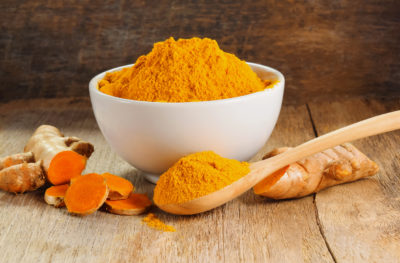Wellness Tip: Turmeric
March 12, 2018 | Julie Moore

Have you heard about the health benefits of Turmeric? Read on to learn how Turmeric is right for your wellness.
What is Turmeric: A spice and a valuable dietary supplement.
The perennial turmeric plant, a relative of ginger, is commonly grown in India and elsewhere in southern Asia. The roots of the plant are boiled and dried into a powder. This powder is used as a spice in cooking (think curry) or formed into capsules, tablets, or teas to be taken as a dietary supplement. Turmeric has been used for hundreds of years in Asian medicine.
Who should try it: Due to its anti-inflammatory and anti-oxidant properties, turmeric is thought to benefit individuals with the following conditions.
- Joint pain, osteoarthritis and rheumatoid arthritis
- Heart disease
- Indigestion and other digestive disorders
- Ulcerative colitis
- Neurodegenerative diseases, e.g. Alzheimers
- Depression
- Skin irritation
- Some cancers
…and many other inflammatory conditions
Why it works: Turmeric contains the active ingredient curcumin which is thought to have both anti-inflammatory and anti-oxidant effects. Preventing or managing chronic inflammation and maintaining a balance of anti-oxidants and free radicals are important to good health.
Tell me more: While inflammation is part of the body’s natural immune response to injury or infection, chronic inflammation is quite harmful. Sustained inflammation can cause fatigue, disease, and conditions such as rheumatoid arthritis and some cancers.
Anti-oxidants are important in cleaning up the free radicals in our system. Free radicals are generated by our bodies during normal metabolic processes and by exposure to harmful conditions such as air pollutants, cigarette smoke, and radiation. Free radicals can damage cell membranes, adversely alter proteins and DNA, and cause disease.
Are there risks: Turmeric may reduce the benefits of certain medications. Consult with your doctor to learn if turmeric is right for you.
Bonus Wellness Tip: If you suffer from any of the conditions above, Acupuncture can help. Acupuncture is a safe effective way to ease the physical and emotional pains of life. At Windrose Acupuncture I offer personalized holistic care in a compassionate setting. Along with treatment, I suggest lifestyle strategies focused on diet, exercise, and meditation to support your healing process between visits.
Book your appointment today. Visit www.WindroseAcupuncture.com or call 215-279-9136.
Julie Moore is an NCCAOM Board Certified Acupuncturist and the founder of Windrose Acupuncture. Influenced by her studies in both the US and South Korea, Julie’s effective use of Acupuncture and other Asian Medicine therapies enables patients to overcome physical and emotional barriers to achieve wellness and balance in their lives.
----------------------------------------------------------------------------
Sources:
Erlich Steven (n.d.) Tumeric. University of Maryland Medical Center. Retrieved from https://www.umm.edu/health/medical/altmed/herb/turmeric.
Gunnars Kris (2017, June 9). 10 Proven Health Benefits of Turmeric and Curcumin from https://www.healthline.com/nutrition/top-10-evidence-based-health-benefits-of-turmeric#section5.
Lobo V., Patil A., Phatak A., Chandra N. (2010). Free radicals, antioxidants and functional foods: Impact on human health. Pharmacogn Rev. 2010 Jul-Dec; 4(8): 118–126. Retrieved from National Institutes of Health. https://www.ncbi.nlm.nih.gov/pmc/articles/PMC3249911/.
National Center for Complementary and Integrative Health (2016, September). Turmeric. Retrieved from https://nccih.nih.gov/health/turmeric/ataglance.htm.
Tayyem RF, Heath DD, Al-Delaimy WK, Rock CL (2006). Curcumin content of turmeric and curry powders [Abstract]. Nutr Cancer. 2006;55(2):126-31. Abstract retrieved from PubMed.gov database. https://www.ncbi.nlm.nih.gov/pubmed/17044766.
Address
1601 Walnut Street, STE 1504
Philadelphia, PA 19102215-205-1815
julie@windroseacupuncture.com
© 2021 Windrose Acupuncture
